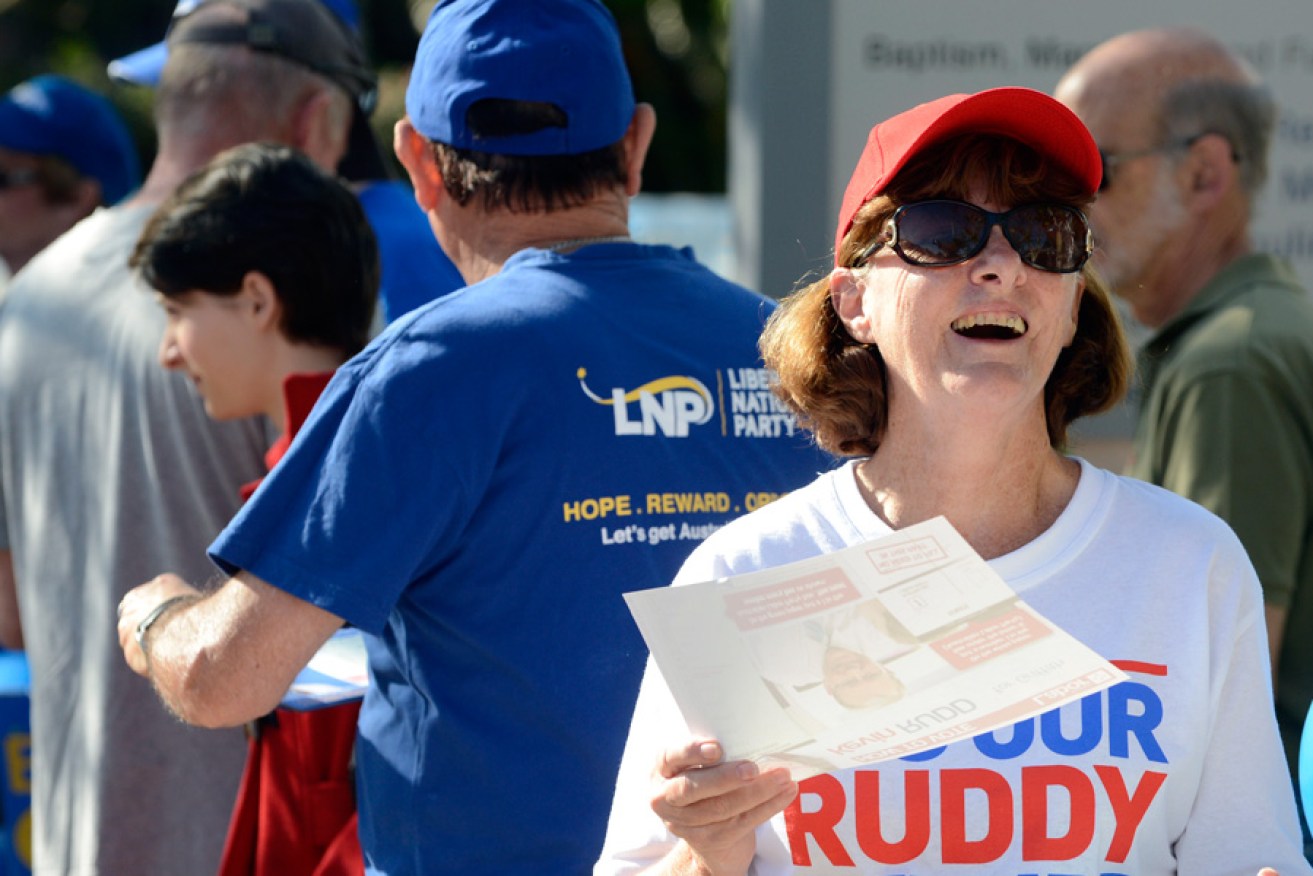Ridicule of ‘micro parties’ misses the point

Volunteers handing out 'how to vote' cards in Kevin Rudd's Brisbane seat of Griffith.
Don’t be tempted to join in the scorn of the micro parties in the Senate, encouraged by the major parties out of blatant self interest and fanned by media who misidentify the real story.
Their election – and the largest informal vote in the House of Representatives in the last three elections – was the result of voters in open revolt against the major parties.
The rage was most obvious in the Senate, with a clutch of new micro party members and the major parties struggling to return Don Farrell (Labor, South Australia) and Arthur Sinodinos (Liberal, NSW).
But the result didn’t come out of nowhere, and the new Senate isn’t the bar scene from Star Wars, despite what ABC’s 7.30 might suggest.
Voters were angry for two chief reasons: cynicism towards the major parties and anger that compulsory preferential voting forces voters to prop them up against their wishes.
The anger is like that against the supermarket duopoly of Woolworths and Coles.
The deleterious effect of compulsory voting was hard to miss during the election campaign.
As an increasingly frazzled media zeroed-in on the gaps in the Opposition’s costings, Tony Abbott told 7.30’s Leigh Sales: “people have had three years to look at me … and I’m very happy to submit myself to the judgment of the people”.
ABC journalist Mark Colvin rightly summarised this as: “Mr Abbott says voters already have plenty of information to help them make their choice”.
Many politicians, Julia Gillard among them, were fond of observing that “at the end of the day, the Australian people will have a choice to make”.
Yes, a compulsory choice.
Like anything forced or compelled, be it conversion to a religion, a confession under torture or voting in an Australian election, the results are problematic.
For Australian politics: cynicism rises, engagement drops and major parties wither into corporate spin machines.
Early figures from the AEC (from Sunday) indicated the informal vote was 5.9 per cent in the House of Representatives, continuing the upward trend from 5.55 per cent in 2010 and 3.95 per cent in 2007.
The AEC tells us that we are not “forced” to vote, but only to attend a polling place and have our name marked off the electoral role (if you don’t, the AEC will fine you).
But the AEC does all it can to force us to vote, barring stationing an AEC officer behind us in the polling booth to supervise – which would breach the secrecy of the ballot box and therefore the Australian Constitution.
But compulsory voting is not as Australian as we might think.
The nine other countries that enforce compulsory voting (according to Wikipedia) don’t exactly reflect the good ol’ Australian way of life: Argentina; Brazil; the Democratic Republic of Congo; Ecuador; Luxembourg; Nauru; Peru; Singapore; Uruguay – a good selection of former military dictatorships, tax havens, Pacific Ocean busted-arse countries and an undemocratic city-state.
So how does compulsory preferential voting affect state and federal politics as practiced by the major parties?
Simply, our major party politicians don’t have to work hard enough for our votes. Why bother creating a vision for the future when just a small policy difference – if any – from the other side of politics will see preferences flow to your side anyway?
Compulsory voting also makes our politicians risk-averse. Real, difficult reform programs become too risky when everyone, including the disengaged and proudly ignorant, casts a vote.
And opaque, our major party politicians are as opaque as decking timber – and about as flat in tone and colour. Why release final costings when you can take people’s votes for granted because you are ahead in the polls?
Opinion polls are a crucial piece of this dysfunctional political system; the flip side of the compulsory voting coin.
In Australia the polls are God and the “two party preferred” numbers His final judgement.
The nexus between the polls and compulsory voting dictated Labor’s leadership machinations for the past six years (among other factors) and allowed Abbott to cruise into Government without being frank about the financial disposition of his future government (among other things).
But we mustn’t blame the politicians. Their’s is a rational reaction to the conditions they face.
A rational reaction by the electorate – given the political outcomes we are seeing — is to end compulsory preferential voting across both chambers.
(Don’t be fooled by calls this week for voluntary preferential voting only the Senate, designed only to hobble the emerging micro parties while leaving the duopoly in place in the House of Representatives.)
Breaking open politics to power of a single “1” vote – no preferences if that’s what the voter wants – would set the cat amongst the pigeons, ushering in a diversity of voices in the House of Representatives.
More deeply though, it would change the way all politicians operated.
They’d have to pay attention to their party members and might even sign-up a few more.
They’d have to work to bring out the vote.
There’d be no room for complacency heading into an election because the polls would no longer mirror electoral support.
Who knows, the best of them might begin to lead, rather than lean on, the people.
Don’t kid yourself however: the major parties would likely still form governments – but they would be better governments.
Jeremy Roberts is a South Australian freelance journalist.




